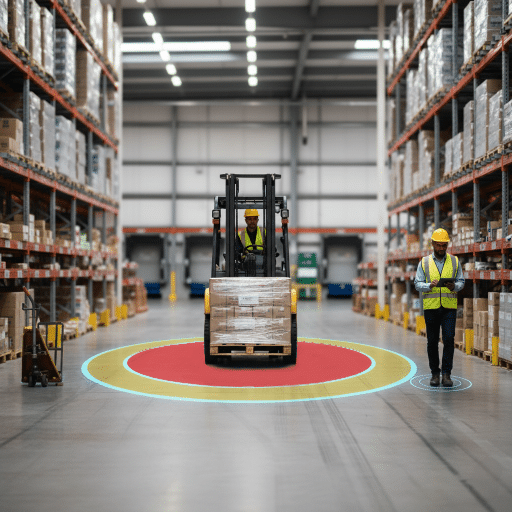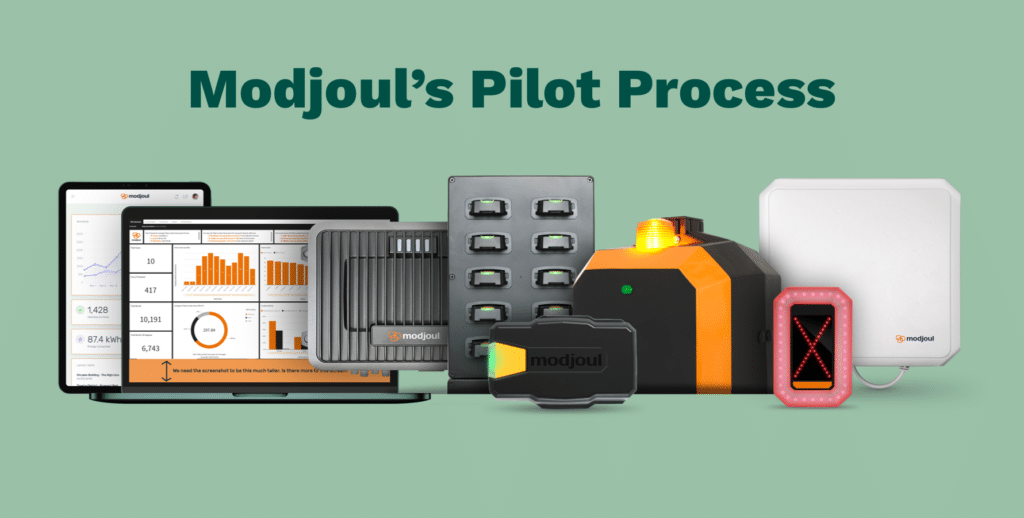Navigating the Challenges of Collision Prevention
Warehousing and manufacturing environments are buzzing with activity, with forklifts acting as the core instruments in ensuring efficient operations. Yet, with this reliance on heavy machinery comes the inevitable risk of collisions, particularly with stationary objects such as columns or racking systems. Modjoul, a leader in technological solutions for industrial safety, addresses this critical issue with innovation that enhances both safety and productivity.
Identifying the Problem: Forklift Collisions with Stationary Objects
In a typical warehouse or manufacturing site, space is meticulously organized to optimize storage and movement. Despite this careful planning, it’s not uncommon for forklifts to come too close to stationary objects. Whether it’s a supporting column, a section of racking, or even a wall, inadvertent collisions can cause significant damage. This damage translates into costly repairs and potential operational downtime, impacting the bottom line and affecting safety protocols.
Sarah Essich, an employee from Modjoul, points out, “It never fails that sometimes that forklift and that column —or that racking system that you have—just come too close to one another, which ultimately can cause damage and higher costs for our customers.” The problem is clear: close proximity between moving machinery and fixed structures is a recipe for frequent collisions.
The Solution: Sensor-Based Proximity Alerts and Speed Control
To combat the challenge of collisions, Modjoul employs a proactive approach by outfitting both forklifts and stationary objects with advanced sensors. These sensors are geared to measure the distance between the forklift and potential obstacles. By establishing customizable distance thresholds, operators receive real-time alerts when a forklift begins to encroach too closely upon a stationary object. This immediate feedback enables operators to adjust their path or speed, effectively preventing an accident before it occurs.
The added safeguard comes with speed control capabilities. Modjoul takes safety a step further by integrating automatic speed regulation. When a forklift approaches a certain proximity level with a stationary object, the human element is bypassed—should the operator not respond in time, the system will reduce the speed of the forklift or even bring it to a complete stop. This vital feature ensures that even in cases of operator inattention or misjudgment, the risk of collision is drastically reduced.
Benefits Beyond Collision Prevention
Implementing these sensor and speed control strategies yields numerous benefits beyond the primary goal of reducing collisions. Firstly, it enhances workplace safety, reducing injuries and potential legal liabilities. With machinery brought to a halt before mishaps occur, workers can focus more on their tasks and less on avoiding potentially dangerous situations.
Secondly, there is a financial upside. Reducing collisions means lowering the costs associated with repair and maintenance of machinery and infrastructure. Additionally, reducing downtime can significantly improve workflow continuity, leading to productivity gains.
Moreover, implementing such technology reflects a company’s commitment to innovation and safety. This can strengthen a company’s reputation, serving as a competitive advantage in industries where safety records and operational efficiency are particularly valued.
Conclusion: Building a Safer, More Efficient Future
Modjoul’s solution is not merely an incremental improvement in warehouse operations, but rather a transformative approach that leverages technology to address long-standing safety challenges. As industries continue to strive for safer and more efficient operations, innovations such as sensor-based proximity alerts and automatic speed control represent cornerstone advancements.
By integrating these technologies, industries can create safer working environments, protect their investments, and maintain seamless operations. As Essich concludes, the combination of these technologies “actually takes out the human element altogether,” illustrating the powerful impact of automated systems in modern industrial settings. With Modjoul’s solutions, businesses can look forward to a future with fewer collisions and a stronger emphasis on safety and efficiency.



